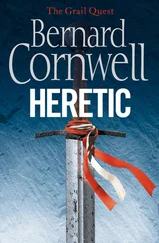
WILDTRACK
A Novel of Suspense
BERNARD CORNWELL
Wildtrack is dedicated
to the memory of
David Watt
PROLOGUE
They said I’d never walk again.
They said I’d be in a wheelchair till they lifted me into the box and screwed down my lid. I should learn a trade, they said. Something cripple-friendly, like computers.
They’d had me for damn nearly a year. They’d put a metal rod into my right thigh, and grafted skin where my thighs and arse had been burned. They did a mixture of rough carpentry and micro-surgery on my spine and, when it half worked—which meant I could twitch the toes on my left foot—they opened me up again and did a bit more. It had all taken months and still I could not walk.
You must get used to it, they said, because you’re never going to walk again. You’re never going to sail again. You’re a paraplegic now, Nick, so kiss it all goodbye. I told them to get stuffed.
“That’s not the spirit, Nick!” Doctor Maitland said in his no-nonsense voice. “There’s no stigma involved, you know. Quite the opposite!” He flipped the pages of a yachting magazine that lay on a pile of similar magazines beside my bed. “And you’ll be afloat again.
You can go sailing this very spring!”
It was the first sign of hope he’d given me, and I responded eagerly. “Can I?”
“My dear Nick, of course you can. There’s a motor sailor on the Solent that’s specially adapted for your sort of case.” My eagerness ebbed. “My sort of case?”
“Ramps for the chairs and a trained volunteer staff on board.” Maitland always spoke of these things in a matter-of-fact voice, as if everyone in the real world went around on wheels with tubes sticking into their bladders. “And perhaps you’d let the press go along?” he added hopefully. “They all want to interview you.”
“Tell them to go to hell. No press. That’s the rule, remember? I don’t want to see a bloody reporter.”
“No press, then.” Maitland could not hide his disappointment.
He loved publicity for his paraplegic paradise. “Perhaps I’ll come along. It’s been many a long year since I went sailing.”
“You can go on your own,” I said sullenly.
“That isn’t the right spirit, Nick.” He twitched at my curtains, which didn’t need twitching.
I closed my eyes. “I’m going to walk out of this bloody place on my own two feet.”
“That won’t stop you going sailing in the spring, will it now?” Maitland, like all his staff, specialized in that bright interrogatory inflection at the end of statements; an inflection designed to elicit our agreement. Once they had us accepting that we were doomed, then half their battle was won. “Will it?” he asked again.
I opened my eyes. “The last time I went sailing, Doc, I was in a friend’s forty-footer coming back from Iceland. She was knocked down near the Faeroes and lost all her mast above the spreaders.
We hacked off the broken stuff, rigged jury hounds, and brought her into North Uist five days later. That was a neat piece of work, Doc.” I didn’t add that the friend had broken his arm when the boat had broached, or that it had happened in the depths of a bloody awful night. What mattered was that we took on that bitch of a northern sea and brought our boat home.
Maitland had listened very patiently. “That was before, Nick, wasn’t it?”
“So there’s no bloody way, Doc, that I’m going to sit on your cripple barge and watch the pretty boats go by.” I knew I was being churlish and ungrateful, but I didn’t care. I was going to walk again.
“If you insist, Nick, if you insist.” Maitland’s voice intimated that I was my own worst enemy. He went to the door, then stopped to glance back into my room. A look of utter astonishment dawned on his round pink face. “You haven’t got a television!”
“I hate bloody television.”
“We find it an extremely effective instrument for therapy, Nick.”
“I don’t need bloody therapy. I want a pair of walking shoes.”
“You really don’t want a television?” Maitland asked in utter disbelief.
“I don’t want a television.”
So that afternoon they sent the new psychiatrist to see me.
“Hello, Mr Sandman,” she said brightly. “I’m Doctor Janet Plant.
I’ve just joined the orientation staff.”
She had a nice voice, but I couldn’t see her because I had my back to the door. “You’re the new shrink?”
“I’m the new orientation therapist,” she agreed. “What are you doing?”
I was holding on to the bedrail with my right hand and edging my right foot down to the floor. “I’m teaching myself to walk.”
“I thought we had a physio department to do that?”
“They only want to teach me how to pee in a wheelchair. They promise me that if I’m a good boy we’ll go on to number two in the spring.” I flinched from the excruciating pain. Even to put a small amount of pressure on my leg was enough to twist a fleshhook in the small of my back. I supposed the psychiatrist would say I was a masochist because, as soon as the pain struck, I put more weight on the leg.
God, I was weak. My right leg was shaking. The nerves of the leg were supposed to be severed, but I’d discovered that if I locked the knee with my hands it would stay locked. So now I thrust the knee down and very gingerly pushed myself away from the bed. I was still holding on to the rail. My left leg took some of the weight, and the pain slid down those tendons like fire. I had no balance and no strength, but I forced myself away from the bed until I was standing half bent, with my right hand gripped so hard about the bedrail that my knuckles were white. I could not breathe. Literally. The pain was so bad that my body could not find the breathing instructions. The pain coursed up into my chest, my neck, then flared red in my skull.
I fell backwards on to the bed. The pain began to ebb out of me as my breath came back, but I kept my eyes closed so the tears would not show. “The first thing I have to do”—I tried to sound nonchalant—“is learn to straighten up. Then how to put one foot in front of the other. The rest will come easily.” I wished I had not spoken, for the words came out as sobs.
I heard Doctor Plant draw up the chair and sit down. I’d noted that she’d made no attempt to help me, which was all part of the hospital’s treatment. We had to fail in order to discover our new limits, which we would then meekly accept. “Tell me about your boat,” she said in the statutory matter-of-fact voice. It was the same voice she would have used if I’d claimed to be Napoleon Bonaparte.
“Tell me how you won the battle of Austerlitz, Your Imperial Highness?”
“It’s a boat,” I said sullenly. My breathing was easier now, but my eyes were still closed.
“We sail a Contessa 32,” Doctor Plant said.
I opened my eyes and saw a sensible, short-haired and motherly woman. “Where’s your Contessa moored?” I asked.
“Itchenor.”
I smiled. “I once went aground on the East Pole sands.”
“Careless.”
“It was at night,” I defended myself, “and there was a blizzard blowing so I couldn’t see the marks. And a dirty great flood tide. I was only fifteen. I shouldn’t have tried to make the Channel, but I thought my old man would tan the hide off me if I stayed out all night.”
“Would he have done?” she asked.
“Probably not. He didn’t like using the cane. I deserved it often enough, but he’s a soft bugger really.”
Читать дальше













